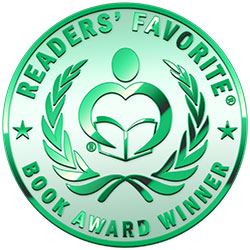
 This author participates in the Readers' Favorite Free Book Program, which is open to all readers and is completely free. The author will provide you with a free copy of their book in exchange for an honest review. You and the author will discuss what sites you will post your review to and what kind of copy of the book you would like to receive (eBook, PDF, Word, paperback, etc.). To begin, click the purple email icon to send this author a private email.
This author participates in the Readers' Favorite Free Book Program, which is open to all readers and is completely free. The author will provide you with a free copy of their book in exchange for an honest review. You and the author will discuss what sites you will post your review to and what kind of copy of the book you would like to receive (eBook, PDF, Word, paperback, etc.). To begin, click the purple email icon to send this author a private email.
![]() This author participates in the Readers' Favorite Book Review Exchange Program, which is open to all authors and is completely free. Simply put, you agree to provide an honest review an author's book in exchange for the author doing the same for you. What sites your reviews are posted on (B&N, Amazon, etc.) and whether you send digital (eBook, PDF, Word, etc.) or hard copies of your books to each other for review is up to you. To begin, click the purple email icon to send this author a private email, and be sure to describe your book or include a link to your Readers' Favorite review page or Amazon page.
This author participates in the Readers' Favorite Book Review Exchange Program, which is open to all authors and is completely free. Simply put, you agree to provide an honest review an author's book in exchange for the author doing the same for you. What sites your reviews are posted on (B&N, Amazon, etc.) and whether you send digital (eBook, PDF, Word, etc.) or hard copies of your books to each other for review is up to you. To begin, click the purple email icon to send this author a private email, and be sure to describe your book or include a link to your Readers' Favorite review page or Amazon page.
![]() This author participates in the Readers' Favorite Book Donation Program, which was created to help nonprofit and charitable organizations (schools, libraries, convalescent homes, soldier donation programs, etc.) by providing them with free books and to help authors garner more exposure for their work. This author is willing to donate free copies of their book in exchange for reviews (if circumstances allow) and the knowledge that their book is being read and enjoyed. To begin, click the purple email icon to send this author a private email. Be sure to tell the author who you are, what organization you are with, how many books you need, how they will be used, and the number of reviews, if any, you would be able to provide.
This author participates in the Readers' Favorite Book Donation Program, which was created to help nonprofit and charitable organizations (schools, libraries, convalescent homes, soldier donation programs, etc.) by providing them with free books and to help authors garner more exposure for their work. This author is willing to donate free copies of their book in exchange for reviews (if circumstances allow) and the knowledge that their book is being read and enjoyed. To begin, click the purple email icon to send this author a private email. Be sure to tell the author who you are, what organization you are with, how many books you need, how they will be used, and the number of reviews, if any, you would be able to provide.

Reviewed by Asher Syed for Readers' Favorite
What They Didn’t Burn: Uncovering My Father’s Holocaust Secrets by Mel Laytner is the non-fiction memoir of the author in which he documents a paper trail that leads to a search spanning the globe. Laytner is a journalist, which proves helpful in both the investigation of his father’s past, which is incredibly extensive, and the writing of this book, which is exceptional. His father is Josef “Dolek” Laytner, a survivor of the Auschwitz sub-camp Blechammer, prisoner 177904. The facts that emerge as the layers begin to truly peel back are stunning. Laytner weaves his father’s tale initially as the story of his search for information, transitioning to the story of his father from the earliest moments under a rising Nazi Party to his days as a prisoner and all that followed.
“My father survived that nightmare and went on to build a new life,” writes Mel Laytner. The line is striking to me. It parallels how very little he knew about his father initially but is written as he finally begins to grasp the scope of what was required to be one of those who survived in What They Didn’t Burn. Tightly written and compelling on every page, the progression of Dolek’s “luck” proves to be a terrifying endurance test. This is most certainly not luck. It is the grit and rapid intelligence of a man who can read a situation quickly to maximize the odds of survival. Knowing what jobs permit indoor work and rations of 1,700 calories per day compared to the 1,300 allotted to "unskilled" workers, though still far below the 2,500 calories a day required by a man doing heavy physical work. Knowing when to partner and bend power and when to fade into a box in the barracks, fighting back only when a precious blanket is stolen, and bribing his way out of a camp for transfer. The death marches are brought to life and the way Laytner describes his father’s final escape... I was choked up. Particularly as he is told: “Well, you are free now. And safe.” Very highly recommended.